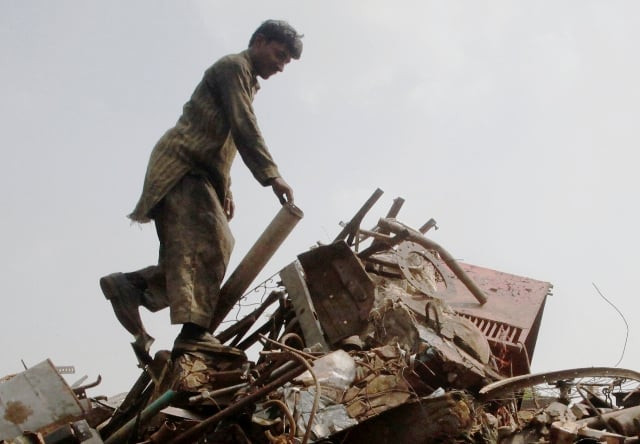A requiem for workers’ rights
The workers will pass each May Day without seeing any improvement in the standard of their working conditions.

The socialist or workers’ state died because of lack of economic realism and the success of capitalism. Colonising states were able to add value to their coercive exports, thus earning enough to spend on workers, after being forced to allow labour unions in conditions of scarcity of labour. In the post-colonial period, newly independent states have to cope with workers’ problems without the advantage of the coercive colonial diktat. Like Pakistan, third world states have more manpower than can be employed, and it is not skilled enough to be put to jobs available in the market. Unlike advanced states, in a country like ours, state and private sectors live side by side, one observing the labour laws the state has made, the other ducking them to increase profitability.
At the bottom of it all is the rule of supply and demand; in other words, the tyranny of the capitalist economy. If the birth rate is high, the economy will lag behind in education and will be unable to impart skills needed for the industry. Unskilled workers are cheap and unprotected because of excess supply. Labour unions emerge to protect them from the market forces. There are laws in the statute books to prevent them from being exploited. But nothing works in conditions of labour glut. The capitalist entrepreneur ducks the laws by keeping his employment on the low side, below the number required before labour laws start biting. The result is a plethora of ‘unregistered’ small enterprises; and there are economists who say the Third World survives because of this unrecorded industrial growth.
The post-socialist global order has made the use of cheap labour — unprotected workers living on starvation wages — the basis for the law of comparative economic advantage. Poor countries start up sweat shops where the masses are exploited to manufacture exportable goods. Because these goods are cheap, they break into the advanced markets of the First World to save capitalism from the curse of inflation. But who gets crushed in the process? The Third World worker who labours in subhuman conditions (barring some sections of the industry abiding by pro-worker rules set down by the First World as preconditions for trade). The comparative advantage doctrine has led to ‘outsourcing’ from the First World and the rise of economies, such as that of China, as world powers.
Pakistan has comparatively few skilled workers because of its small industrial base, but what about the farm labourers enslaved by the large agrarian sector in conditions that can only be describes as hair-raising? In the cities, small-scale enterprises take advantage of an over-supply of manpower to exploit the poor, unmindful of the effect of such exploitation in the shape of poor quality products. Labour unions are easily penetrated by capitalists who don’t pay the taxes they should be paying. As for the labour leaders, they eventually start behaving like a mafia unto themselves, forgetting their commitment to the workers.
Can a country cut down on population growth while improving its quality through good ‘functional’ — as opposed to ‘ideological’ — education? We need to increase the number of the educated in the country, especially women. In Pakistan, al Qaeda targets girls schools, against which Pakistan must stand as one. It is only when the quality of our manpower improves that market forces favouring workers come into play. With the current state of education in Pakistan, the workers will pass each May Day without seeing any improvement in the standard of their working conditions.
Published in The Express Tribune, May 1st, 2011.














COMMENTS
Comments are moderated and generally will be posted if they are on-topic and not abusive.
For more information, please see our Comments FAQ